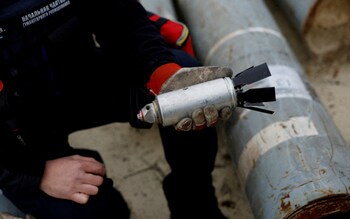Chinese warship accused of endangering Australian Navy divers with sonar pulses
Naval clash in international waters as a Chinese destroyer's sonar injures Australian divers, sparking diplomatic concerns

Naval clash in international waters as a Chinese destroyer's sonar injures Australian divers, sparking diplomatic concerns



Global Combat Air Programme, a joint project between the UK, Italy and Japan is likely to be based in London, sources say

Weapon system to be part of Ministry of Defence’s Land Demonstrator Programme where the Army tests and experiments with new capabilities

Woman, whose mother abandoned her when she was three, has lost three legal challenges to join her father after spending her life in Nepal



The personnel were taking part in a multilateral training exercise in Australia

Deborah Penny, Britain's first transgender person to serve on the front line, took part in the talk Sandhurst

Defence minister says there is no ‘philosophical barrier’ to raising the limit above 60

Maths and history combine in a new book which reveals the pivotal role Sir Keith Park played in 1940

Western captains in the Far East need government backing, or we'll lose people

Zelenskyy's forces desperately need bullets, shells, tanks – and jets. The West is ignoring their pleas

Military wives make a rare Moscow protest against unending deployment



Military ambitions for inclusivity under scrutiny as Royal Air Force pursues diversity recruitment following discrimination scandal

Ukrainian planners will need to keep in mind the old military maxim: never forget the enemy gets a vote

Former Army chief Lord Dannatt cautions against over-reliance on technology in warfare

Emails intended for the Pentagon were sent to Mali because of the accidental omission of an 'i' from an email address.

Members of 16 Air Assault Brigade develop a mobile surgical unit that can provide ‘NHS-standard’ care to troops on the front line

Last year the aircraft carrier’s ‘landmark mission’ to US was cancelled because of propeller shaft problem, causing embarrassment to the MoD

Sir Richard Moore calls on those ‘watching in horror’ to ‘join hands with us’ and ‘work together to bring the bloodshed to an end’

Defence Secretary stands by commitment to reduce soldiers and invest in technology




